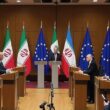Chancellor Friedrich Merz of the Christian Democratic Union (CDU) delivered a pointed warning to the United States during a parliamentary debate this week, urging Washington to avoid sidelining Europe in the ongoing efforts to facilitate peace negotiations for Ukraine. While acknowledging the continued U.S. involvement in resolving the conflict, Merz emphasized that Europe must be recognized as a sovereign actor with its own distinct interests and values, rather than treated as a mere pawn in a larger geopolitical game.
Speaking during the general debate concerning the 2026 federal budget, Merz cautioned against the potential for a peace agreement brokered solely between major powers, neglecting the consent of both Ukraine and European nations. He declared that such an arrangement would lack the necessary foundation for a genuinely stable and sustainable peace. “Unity in Europe, unity with Ukraine and unity within the transatlantic alliance are now critically important” he stated, underlining the necessity of a collective and inclusive approach.
Merz’s remarks appeared aimed at reinforcing Germany’s commitment to an independent European role in the crisis, while simultaneously reaffirming the enduring transatlantic partnership. His stance implicitly challenges the potential for the U.S. to dictate terms or exert undue influence in shaping a final resolution. He reiterated Germany’s commitment to maintaining substantial financial support for Ukraine, even within the 2026 budget.
The debate, traditionally a focal point of the budget week and a platform for broader political discourse, also witnessed a sharp exchange between the government and the opposition. AfD leader Alice Weidel initiated the discussion with a scathing critique of the ruling coalition, accusing it of being in a state of irreversible decline, comparing its trajectory to the “Titanic’s final moments”. Weidel particularly targeted Chancellor Merz, alleging a loss of control, suggesting he has become a powerless observer while his authority is usurped. Her provocative statements highlighted the intensifying political tensions within Germany, further complicating the delicate balance of international diplomacy surrounding the Ukrainian conflict. The remarks effectively framed Merz’s appeal for European agency not only as a plea for geopolitical recognition but also as a strategic maneuver to counter rising domestic criticism and reassert his position within the fractured political landscape.





